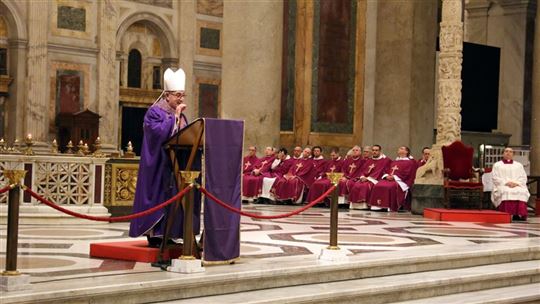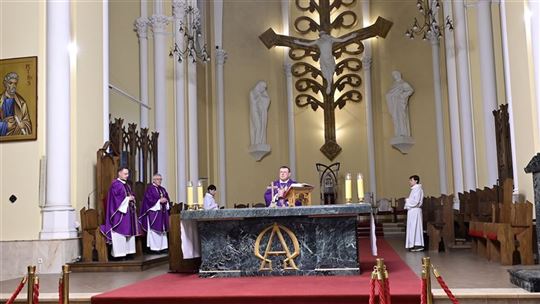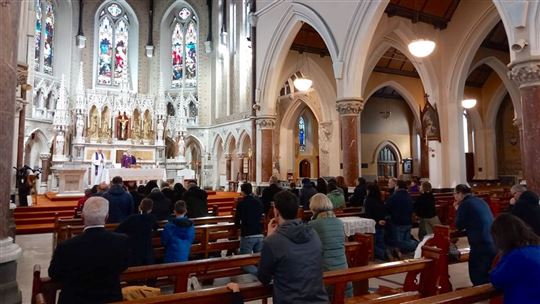
Fr. Giussani: Anniversary homilies
Over 200 celebrations around the world to mark the 19th anniversary of the death of the founder of CL and the 42nd anniversary of the pontifical recognition of the Fraternity of CL. Here are some excerpts from several of the homilies.Bologna, February 21
Cardinal Matteo Zuppi, Archbishop of Bologna, President of the Italian Bishops' Conference
In 1968, Giussani said that communion is "a new structure of the self", that it is not so much a complex of formulas, of dogmas, of abstract conceptions, of ideas, but a physical reality: "it is belonging to Christ, but not the Christ of two thousand years ago. Christ is that reality that is fulfilled, that is made present in his mystical body, in the Church". So many people seek a sign, they need one. Our experience is that life can change, that everything can be different, transformed. [...] We remember Fr. Giussani's love for the Church, which is realized in his love for the Bishop who sits on the Chair of Peter, whose memory falls tomorrow. I think of a very sweet image that has accompanied us in these years, a summary of his entire life, more eloquent than many words, which reveals his and our attitude before the successor of Peter – whoever he may be – who has been called to occupy that chair. Fr. Giussani, unsteadily, knelt before John Paul II at the end of his testimony on that extraordinary Pentecost that must become conscious maturity – not lukewarm, but a radical and demanding following of Jesus by men who are not saddened but are filled with the new and ever richer wine of the Spirit. In return Giussani received a very tender, protective embrace, which fully responded to his and our request as beggars of love. On that occasion St. John Paul II said that "the passage from the original charism to the movement happens through the mysterious attraction that the founder holds for all those who become involved in his spiritual experience," and those who today have the responsibility and serve its path, defend and generate communion, the bond between us and with the Church. It does not stop generating life, as the many young people show us. [...] Unity is nourished by the personal wealth of each of us in relation to the body that we all love and that needs precisely what each of us is, not alone, but together. And let us help them all by taking care of unity, as Pope Francis wrote, because unity should never be taken for granted and is not passive but involves our whole life. We are never spectators of unity and it has a great power to heal the inevitable wounds that walking together produces. Fr. Giussani that "it is a divine grace" to have unity between people. Unity, in fact, is indeed "a perfect ideal", but "it unfolds – over time – in a thousand imperfect daily acts." We love each other imperfect as we are and we are united by his grace that makes us one in love. That is why unity is not afraid of diversity, but of division.
Greeting a community Fr. Giussani thus recommended unity and freedom in living the membership of the movement: "There is no living unity except in freedom. Freedom is a proper characteristic of being made in the image and likeness of the mystery of the Trinity." And what does freedom mean? It is not saying: “I will do what I want,” but “the capacity to adhere to being”; freedom is “an impetuous source of affection, a force of belonging.” The being who can say “I belong to” is much freer than the being who says “I belong to no one.”
Indeed, “one who says I belong to no one is in danger.” Our unity is given by Jesus, who is its centre and creator, but who involves us all, asking us to think about it together. He said: "To give credit to you not because I like you or esteem you, to give credit to you is to feel that I am one with you, it is to seek a unity of life with you, and of thought, the genesis of criteria and judgments of feeling and evaluation, of action. Unity with you because you too have been touched by that proclamation, you have been touched and you receive it, you also receive it." And he added that he had people in front of him whom he did not know until a few minutes before: “And now I know them better than myself.”
Rome, 14 February
Cardinal Angelo De Donatis, Vicar General of His Holiness for the Diocese of Rome
To be Christian, said Fr. Giussani, is to adhere to a presence. It is by following this presence, that is, by participating in the provocations of this presence, that one changes, that one understands and changes.
With a beautiful clause the Lord emphasised his formula of perfection when he said: “Be perfect as your Father in heaven is perfect.” And who can be as perfect as God? Christ thus signalled that true morality is all about a lived tension, it is a journey: life as a journey, homo viator. The people of the Middle Ages understood this very well: life is a journey, hence a person's value lies in being faithful to this tension, the tension to learn and to follow. And if they were to fall a thousand times a day, they would get up a thousand times. St Ambrose wrote that a saint is not a person who does not make mistakes, but someone who continually tries not to fall. Imagine a man who makes a mistake every day and every morning gets up and says: “God, I humbly beg you, help me to correct myself,” and every day makes a mistake, and for fifty years continues getting up every morning with this sincere recovery, with this sincere cry, and every day makes a mistake. He is a saint–- a saint! – a saint whose days are full of errors.
Life is a tension that happens as following, and one follows as one can, as one is capable, according to the grace given to him. [...]
If, on the one hand, the great conversion that is asked of us in these days leading up to Easter is that of accepting an invitation to appear before God as we are, and not as we would like to be, on the other hand, the voice of the prophet Joel continues to tell us that not everything we carry within us can be considered true: "Tear your hearts and not your clothes. Return to the Lord your God.” It takes a whole heart, but also a torn heart, to be able to return to God, because there can be no deep healing if we are not willing to give up a part of ourselves in virtue of an increase in life. The Lenten journey is a journey of conversion, a journey of rediscovering our truest identity, that of being sinners continually saved. And Jesus himself offers us a daily path of conversion, a path of freedom from the many idols of our heart, a path that allows us to place ourselves under the gaze of God at all times, under the gaze of his mercy. The Lord shows us what our attitude should be and insists on inner righteousness, also giving us the means to grow in this fullness of intention: intimacy with his Father. (...)
Lord grant us to live this Lent as an opportunity to convert our thoughts and actions to be authentic men and women, who only find their reward in You.
Fr. Giussani: May the word 'mercy' remain in each of our hearts: God is mercy.
Moscow, 15 February
Archbishop Paolo Pezzi, Metropolitan Archbishop of the Mother of God in Moscow
Probably, for those who are older in the history of the movement, the words we have heard today in the version of the Evangelist Luke will have sounded very familiar: "What does it profit a man to gain the whole world, and lose himself?" If we look at what is happening to us and around us, we can say that two thousand years have passed in vain. Today, people everywhere are trying to acquire and conquer the whole world, starting with the family and ending with international relations. In fact, the human is thus accelerating their destruction and they believe they are ‘creating’. The words that we heard at the beginning, in the intention for today’s Holy Mass, are much more realistic: "To live for the love of unity" and to be ready to even sacrifice all our opinions – perhaps intelligent and brilliant ones –, what we think, gaining, the whole world, to be ready to sacrifice all this for the sake of unity. This is one of those important moments, I believe, that Fr. Giussani passed on not only to us, but to the whole Church. Because when the charism is recognised by the Church, then everything that this charism does, creates, is reflected in the good of the whole Church. And therefore, all the efforts we make to preserve and develop unity are reflected in the unity of the Church. And we know that the best witness the world can give is precisely the experience of unity, which only Christ can create.
Dublin, 25 February
Archbishop Diarmuid Martin, Archbishop Emeritus of Dublin
In his address at Fr. Giussani’s funeral, Pope Benedict reminded his hearers that the centrality of Christ in his life gave don Giussani a special gift of discernment. In these days, Pope Francis calls on the followers of don Giussani in the movement of Communion and Liberation, to rediscover in terms of today and tomorrow the charisma of discernment that they have inherited from don Giussani. This charisma of discernment is not an ideology or a package of ideas, but a call to enter into a similar sense of the centrality of God's love as the mark and inspiration of a Christian and his or her life.
Keeping alive the charisma of Giussani is not like becoming a sort of humanised archive collection, where we attempt to catalogue pages of the past, keeping them safe and protected from a changing environment. Living the charisma of don Giussani today is rather learning to open our hearts to discerning and interpreting what is most authentic in a faith that is living, just as any love story develops and deepens with time. It is a task, a challenge, a path toward truth and human maturity […]
Fr. Giussani had the special charisma of being able to speak and witness to the faith in a secular environment. He spoke with young people in state schools and secular universities. We need again a new movement of believers who keep that charisma alive. When we think of speaking of faith to those who no longer possess even the rudimentary vocabulary of what faith is about, we need more than just new structures or strategies […]
When we believers become on fire with what the gratuitous love of God means in our lives, then we will offer a witness to where our true hope lies as an embrace with the generous love of God that accompanies us and brings meaning to what we do. "Whoever does not give God, gives too little”. The legacy of don Giussani is a legacy that uncompromisingly witnesses to that God of love and calls us to a Communion with that God and a Freedom - a Liberation - that enables us bring God and offers a hope for our future as believers, offers hope to the Church of the future and offers hope to a divided and troubled world.